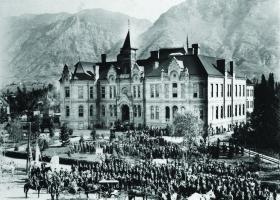Read Time: 6 minutes
In 1892 Benjamin Cluff Jr. was appointed third principal of Brigham Young Academy. When the school was renamed Brigham Young University in 1903, Cluff became the first president.
He not only solidified the university’s financial security but also established a firm academic foundation that others have built upon. In addition, his administration initiated intercollegiate athletics and school traditions that continue today. Since 2003 the David O. McKay School of Education has celebrated Cluff’s legacy by sponsoring lectures by distinguished scholars as he did in his day. Awards are presented in Cluff’s name to BYU–Public School Partnership participants. The McKay School is proud to honor Cluff’s memory through this yearly event.
BENJAMIN CLUFF LECTURE 2015
Alan J. Daly, professor and chair of the Department of Education Studies at the University of California, San Diego, spent several weeks preparing for his address by studying Benjamin Cluff’s diaries online through the L. Tom Perry Special Collections at the Harold B. Lee Library. He focused his reading on the years 1886 to 1903 because Cluff had been traveling throughout the United States and then had returned to implement new ideas at Brigham Young University.
Daly said:
There are several things that come out if you take the time to read these diaries. If I were in his family, I would take great pride in this man, who was a really incredible individual and a visionary in many ways, particularly as related to education.
Daly learned Cluff was particularly concerned with nurturing communities:
In the text he discusses his work in school and writes, “[The Faculty] soon worked in complete harmony with me for the common good.” This idea about working together for something bigger than themselves is a recurring theme, and it seems this is the way Mr. Cluff lived his life.

After reading the Cluff diaries, the following quote spoke to me, which I think is really important for the work we do together in education: “We are like dwarfs sitting on the shoulders of giants. We see more, and things that are more distant, than they did, not because our sight is superior or because we are taller than they, but because they raise us up, and by their great stature add to ours.” In this room we all stand on the shoulders of giants when we do our work. We connect to those who have come before us and recognize the excellence that already exists within our own communities, in our own families, and in our schools. Building on our history and reaching for a greater tomorrow is what we all are about and strive for every day. From my read, it is certainly what Benjamin Cluff was about.
We are greater when we stand together. An ancient African proverb captures this idea well: “If you want to go fast, go alone. If you want to go far, go together.” And in the work of educating all, we need to go far. We don’t need to go as fast as we have done. We need to be thoughtful, mindful, connected—to embrace our humanity. Celebrate our relationships with one another every day, own who we are and where we come from—it is that journey that holds the greatest promise for us all.
In my work I am about relationships and the deep power that lies within our connectivity and the social side of change. My research on social networks is focused on how knowledge moves and connects people, and in education all of our work is social work. One of the reasons I feel so privileged to be here at BYU in the McKay School today is because all of you live at the intersection of scholarship and practice in many of the same ways Benjamin Cluff did so many years ago.
The promise of education is the development of youth and families, the empowering of communities, and the ability to embrace different perspectives. Our differences do not define us but rather strengthen us as people. To meet the promise and potential of education, we must be connected and we must be bold.
For me, Margaret Mead captured it best: “Never underestimate the power of a small group of committed citizens to change the world.
Indeed, it has never been done otherwise.” I believe deeply and have been reminded of that throughout my visit to BYU, that we are that small group of committed citizens, and I have no doubt that we will change the world for the better.